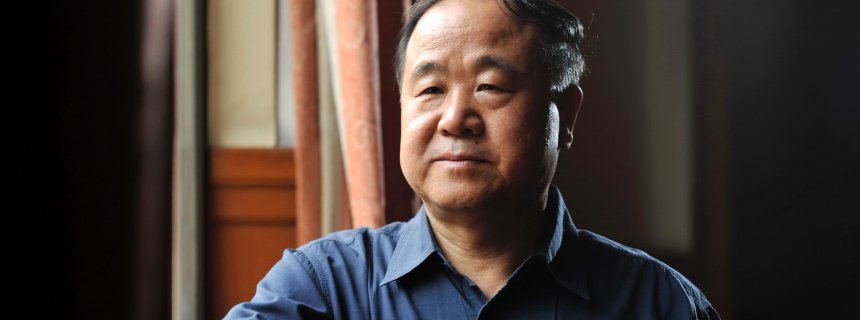When Chinese novelist Mo Yan won the Nobel Prize in Literature in 2012, controversy erupted—while state media celebrated him as the first Chinese national to win the prize [Chinese], many were reminded of jailed Nobel Peace Prize laureate Liu Xiaobo, and 2000 literature laureate Gao Xingjian, who had immigrated to France prior to his win. Another point of contention was Mo’s hand-written contribution earlier in 2012 to a commemorative edition of Mao Zedong’s 1942 speeches at the Yan’an Forum on Literature and Art, the gathering that set the CCP standard for the artistic endeavor: creative work is ideological work, and it should serve the Party. (Xi Jinping last year echoed Mao’s message at the Beijing Forum on Literature and Art.) At The Telegraph, Tom Phillips reports that Mo Yan is attracting fresh criticism after voicing support for Xi Jinping at a time when the president is overseeing crackdowns on free expression in China:
“I judge that the Chinese Communist Party, more than any other party in the world, wants China to be rich and powerful,” the 59-year-old author told the website for the Central Commission for Discipline Inspection, the anti-corruption agency.
“Our country’s president, Xi Jinping, more than any other world leader, hopes that Chinese people can live well.” The author also appeared to back the president’s high-profile anti-corruption drive by announcing that his next book would focus on the perils of thieving officials.
Murong Xuecun, a rising literary star and outspoken critic of Beijing, said he had been appalled by Mo Yan’s “shameful” comments.
“You are a Chinese writer, writing about Chinese life and you should know what is going on in this country,” said the writer, whose real name is Hao Qun.
“Control of news media has become increasingly harsh, more websites have been blocked by the Great Firewall, social media platforms have withered away with many accounts being cancelled or blocked [and] many activists who dared to speak out have been put into prison,” he added, citing the detentions of civil rights lawyer Pu Zhiqiang, activist Guo Yushan, and Tie Liu, an 81-year-old writer who was taken from his home after criticising China’s propaganda chief. […] [Source]
Read more about ongoing crackdowns on Internet speech and civil society activism, via CDT.








